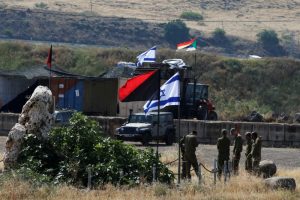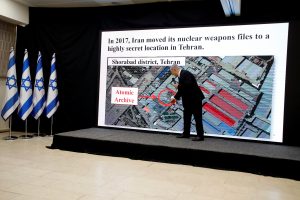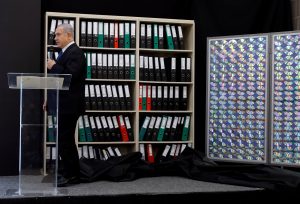
By Dan Williams and Angus McDowall
JERUSALEM/BEIRUT (Reuters) – Israel said it attacked nearly all of Iran’s military infrastructure in Syria on Thursday after Iranian forces fired rockets at Israeli-held territory for the first time.
It was the heaviest Israeli barrage in Syria since the start in 2011 of its war, in which Iranians, allied Shi’ite Muslim militias and Russian troops have deployed in support of President Bashar al-Assad.
The Syrian Army Command said Israel’s attack killed three people and injured two others. A Britain-based war monitor, the Syrian Observatory for Human Rights, said the strikes killed at least 23 military personnel, including Syrians and non-Syrians.
The White House, in a statement, condemned Iran’s “provocative rocket attacks” from Syria and said it supported Israel’s right to defend itself.
Expectations of a regional flare-up, amid warnings from Israel that it was determined to prevent any Iranian military entrenchment in Syria, were stoked by U.S. President Donald Trump’s announcement on Tuesday that he was withdrawing from the 2015 nuclear deal between Iran and world powers.
The Trump administration portrayed its rejection of that agreement as a response, in part, to Iran’s military interventions in the Middle East, underpinning Israeli Prime Minister Benjamin Netanyahu’s tough line towards Tehran.
Israel said 20 Iranian Grad and Fajr rockets were shot down by its Iron Dome air defense system or did not reach targets in the occupied Golan Heights, territory captured from Syria in a 1967 war.
The Quds Force, an external arm of Iran’s Revolutionary Guards, carried out the rocket salvo, Israel said.
There was no immediate comment from Iran.
Iran and Israel were already drawing deeper into confrontation before Trump pulled the United States out of the deal, but his move has shaken up the region. Within Iran, it could empower hardliners while weakening the moderate camp that has sought better relations with the West.
Syrian state media said Israel launched dozens of missiles and hit a radar station, Syrian air defense positions and an ammunition dump, underscoring the risks of a wider escalation involving Iran and its regional allies.
“We hit … almost all of the Iranian infrastructure in Syria,” Israeli Defence Minister Avigdor Lieberman said at the annual Herzliya security conference near Tel Aviv. “I hope we finished this chapter and everyone got the message.”
Lieberman said the Iranian rockets either fell short of their targets – military bases in the Golan – or were intercepted.
The White House said: “The Iranian regime’s deployment into Syria of offensive rocket and missile systems aimed at Israel is an unacceptable and highly dangerous development for the entire Middle East.”
The Syrian foreign ministry said the Israeli attack indicated “the start of a new phase of aggression” against Damascus.

Israeli soldiers are seen in the Israeli-occupied Golan Heights, Israel May 10, 2018. REUTERS/Ronen Zvulun
CALLS FOR RESTRAINT
Thursday’s exchange followed a suspected Israeli rocket strike in Syria on Tuesday on a military base in Kisweh, hours after Trump’s announcement on the nuclear deal.
The Syrian Observatory for Human rights said 15 people, including eight Iranians, were killed in that attack. A commander in the pro-Syrian government regional alliance said there were no casualties. Israel, as it has typically done in similar incidents, neither confirmed nor denied a role.
France urged Iran on Thursday to refrain from all “military provocation” and cautioned it against “all temptations for regional hegemony”.
Russia, which is generally friendly to Israel but fights in Syria’s civil war on the same side as Iran, called on both to show restraint and resolve differences through diplomatic means.
Israeli military spokesman Lieutenant-Colonel Jonathan Conricus said Israel destroyed dozens of Iranian military sites in Syria, as well as Syrian anti-aircraft units that tried unsuccessfully to shoot down Israeli planes.
He said the military focused on inflicting “long-term damage on the Iranian military establishment in Syria” and assessed “it will take a substantial time to replenish”.
Russia’s defense ministry said Syria had shot down more than half of the missiles fired by Israel, RIA news agency reported.
In the Golan, Israeli schools opened as usual on Thursday morning after sirens sent residents to shelters overnight.
The Israelis fear that Iran and its Lebanese ally Hezbollah are turning Syria into a new front against them. Israel says its occasional strikes in Syria aim to prevent such an outcome.
Iran vowed retaliation after a suspected Israeli air strike last month killed seven of its military personnel at a Syrian air base. Israel regards Iran as its biggest threat and has repeatedly targeted Iranian forces and allied militia in Syria.
(Additional reporting by Jeffrey Heller in Jerusalem; Dahlia Nehme and Tom Perry and Ellen Francis in Beirut; Writing by Jeffrey Heller and Angus McDowall; Editing by Tom Perry, Mark Heinrich and Peter Graff)










